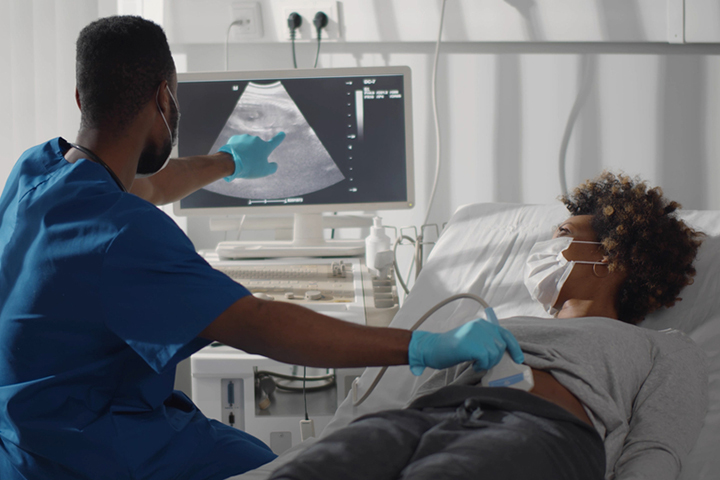
Image: Shutterstock
Pregnancy can be the most exciting time of your life, but it can also feel surreal at times. Although your body is growing and changing to accommodate your new little family addition, and your hormones are all over the place, it can be hard to really fathom that you are going to have a baby. For most parents, things become extremely real when they first hear their baby’s heartbeat. It helps them feel connected to their little one and hastens their anticipation to meet their special bundle of joy. So, not only is listening to your baby’s heartbeat an indication that they are healthy and developing well, it can also bring you closer to your baby, which is why it is so important. So, if you’re wondering when you will get to hear your baby’s little beating heart, we’ve got some answers for you. Read on to know more!
When Does A Baby Have A Heartbeat?
You can see the early signs of a baby’s heart beating on an ultrasound as early as six weeks into a pregnancy. At this stage, the heart is just a tube, not fully formed. It slowly takes shape by bending and twisting. The term “heartbeat” is used loosely here; it’s more like “cardiac activity” since the heart isn’t complete yet. What you hear or see on the ultrasound is a machine translating signals that show the heart starting to work. A baby’s heart is one of the first things to develop because it needs to supply blood and nutrients to other growing organs.
What Does A Fetal Heartbeat Sound Like?
Image: Shutterstock
Many women often compare their baby’s heartbeat to the sound of a galloping horse. This is because the embryonic and fetal heartbeat is fast, about 110 to 160 beats per minute. If you hear a whooshing sound, this is not a heartbeat. This is usually caused by movement or the monitor traveling past the placenta. Another misconception that pregnant women have, is that if they hear two heartbeats, it means they are having twins. This isn’t always the case. Most of the time, the second heartbeat is just your heartbeat in the background. If the heart rate of the embryo or fetus is healthy, it’s a sign that development is progressing normally. Once you see or hear your baby’s heartbeat, you are mostly in the clear as the risk of having a miscarriage at this point, that is, week 6 is less than ten percent. And this goes down to 1 percent after week 9!
What If Your Provider Can’t Detect A Heartbeat?
There are a few reasons why your doctor or midwife may not hear your baby’s heartbeat in the first trimester. It might be too early in your pregnancy, especially if your periods are irregular. They’ll schedule another check-up soon, so no need to worry. Sometimes, the baby’s position in your belly makes it hard to find the heartbeat, or if you’re carrying some extra weight, it can be tricky to detect. In rare cases, there might be a pregnancy complication called ectopic pregnancy, which is a medical emergency. Lastly, if they can’t find the heartbeat when they expected to, it could be a sign of a miscarriage.
How You Will Hear Your Baby’s Heartbeat
Image: Shutterstock
A fetal Doppler, which is a handheld ultrasound device will be used by your provider to check your baby’s heartbeat. This will happen at every prenatal visit after 10 weeks. This procedure is painless and any slight discomfort experienced will be due to the cooling effect of the ultrasound gel applied to your stomach or the slight pressure of the doppler pressing your lower abdomen to find a strong heartbeat.
Ensuring your baby has a healthy heart begins with proper prenatal care. Regular check-ups with your healthcare provider are essential for monitoring your baby’s development and addressing any potential issues early on. Maintaining a balanced diet rich in essential nutrients such as folic acid, iron, and omega-3 fatty acids contributes to heart health. Staying well-hydrated is also important, so make sure to drink enough water. Engaging in regular, moderate exercise, as advised by your healthcare provider, promotes a healthy heart for both you and your baby. These steps collectively help in fostering a strong foundation for your baby’s heart health from the very beginning.
If you can’t hear your baby’s heartbeat right away at week 6, there is no need to panic. Give your pregnancy time to progress and ensure that you are eating and resting well. You will hear your baby’s little heart soon enough!
Sources
1. What is the “normal” fetal heart rate?, NCBI
2. Fetal cardiac function during the first trimester of pregnancy, NCBI














